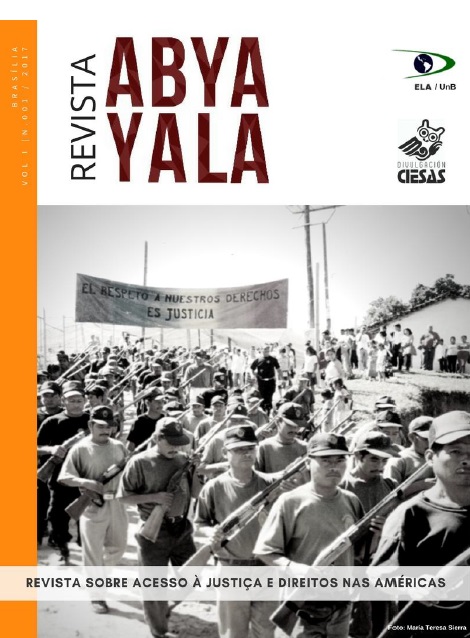Institutional violence against users of cocaine base paste in Uruguay
Keywords:
institutional violence, drug policy, drug useAbstract
In the present work different violence is shown towards users of cocaine base paste of Montevideo. For them, the Uruguayan criminal system imparts "justice" in almost summary forms, and the
police punishes them daily based on the Law of Faults. This is not contradictory with the Cannabis Regulation Law (the two laws were passed in the same period of government, 2010-2015), but
rather its counterpart: in Uruguay, since the beginning of the 20th century, the State protects its citizens At the same time that it exiles to the more obscure tutelary places (prisons and manicomial
colonies) to whom, for different reasons, do not exercise their citizenship. Subjugated in a stigma that makes them, beyond their actions, guilty actors, the pasty roam between the penal system, the
violence of the illicit market and the edges of the social protection system.
Downloads
References
Azaola, E. (2012). La violencia de hoy, las violencias de siempre. Desacatos, (40), 13-32.
Bardazano, G (2014) “Respuestas estatales a los usuarios de sustancias psicoactivas en Uruguay: entre la alternativa y la profundización de la guerra a las drogas”, en: CEDD, En busca de los derechos. Usuarios de drogas y las respuestas estatales en América Latina, CIDE, México.
Barrán, J. P. (1992). Medicina y Sociedad en el Uruguay del Novecientos. El poder de curar. Montevideo: Banda Oriental.
Bourgois, P. (2009). Treinta años de retrospectiva etnográfica sobre la violencia en las Américas. In Guatemala: violencias desbordadas (pp. 27-62). Servicio de Publicaciones.
Bourgois, Ph. (2004) “The Continuum of Violence in War and Peace: Post–Cold War Lessons from El Salvador”. Scheper-Hughes, N. & Bourgois, Ph, Violence in War and Peace, Malden, Mass.: Blackwell.
Bourdieu, P. (1999) Contrafuegos, Anagrama, Barcelona.
Bourdieu, P. (1997) Razones prácticas. Sobre la teoría de la acción, Anagrama, Barcelona.
Caetano, G. (2012) La república batllista, Ediciones de la Banda Oriental, Montevideo.
Das, V. & Poole, D. (2004) Anthropology in the Margins of the State, School of American Research Press, New Mexico.
Fraiman, R. & Rossal, M. (2011) De calles, trancas y botones. MI, Montevideo.
Garat, G. (2013) “Un siglo de políticas de drogas en Uruguay”. Análisis N° 1, FESUR, Montevideo.
Goldstein, P. J. (1985) “The drugs/violence nexus: a tripartite conceptual framework”, Journal of Drug Issues, vol. 15, pp. 493-506.
García Salgado, R (2011) “Oteada discreta sobre la prohibición y la reducción de daños”, Rayuela. Revista Interamericana sobre niñez y juventud. 2.
Guigou, L. N. (2003). La nación laica: religión civil y mito-praxis en el Uruguay. Montevideo: Ediciones La Gotera.
Hevia Coscuelluela, M. (1985). Pasaporte 11333: Uruguay ocho años con la C.I.A. Montevideo: suplemento de Liberación Nacional.
Karandinos, G., Hart, L. Castillo, F. & Bourgois, P. (2014). The Moral Economy of Violence in the US Inner City. Current Anthropology 55,1.
Loeck, J. (2014) A dependencia química e seus cuidados. Antropología de políticas públicas e de experiencias de indivíduos em situacao terapéutica na cidade de Porto Alegre. RS, Tesis de doctorado en Antropología Social, UFRGS, Porto Alegre.
Martínez, M. L. (2010). Historia de la producción de carburante nacional en Uruguay. Llull: Revista de la Sociedad Española de Historia de las Ciencias y de las Técnicas, 33(72), 289-314.
Menéndez-Carrión, A. (2015) Memorias de ciudadanía. Avatares de una polis golpeada, Fin de Siglo, Montevideo (tomo 1). Panter-Brick, C. (2002). Street children,human rights, and public health: A critique and future directions. Annual review of anthropology, 147-171.
Renoldi, B. (2014). Los problemas de las soluciones: Una lectura antropológica de la política en las drogas ilegales. Apuntes de Investigación del CECYP, (24).
Rose, N, O'Maley, P &Valverde, M (2012) “Gubernamentalidad”. Astrolabio Nueva Época, 8.
Rossal, M. (2005) Ritos y mitos políticos, Lapzus, Montevideo.
Sapriza, G. (2009). El caso del aborto en el Uruguay de Terra, 1933-1938. Revista de derecho penal, (18), 79-85.
Suárez, H. & Ramírez, J. (2014) “Los desposeídos” en: Rossal, M. & Suárez, H. (Org) Fisuras, JND – FHCE, Montevideo
Vanger, M. I. (1983). El país modelo: José Batlle y Ordóñez, 1907-1915. Montevideo: Editorial Arca.
Wacquant, L (2012) Three steps to a historical anthropology of actually existing neoliberalism, Social Anthropology/Anthropologie Sociale (2012) 20, 1.
Downloads
Published
How to Cite
Issue
Section
License

This work is licensed under a Creative Commons Attribution-NonCommercial 4.0 International License.
The sending of contributions to Abya Yala implies the assignment of copyright and publication to the Journal, observing the Attribution-Non-Commercial 4.0 International (CC BY-NC 4.0) adopted.
The content of the texts submitted to and published by the journal will be the sole responsibility of their respective authors.
Copyright: https://creativecommons.org/licenses/by-nc/4.0/deed.en








